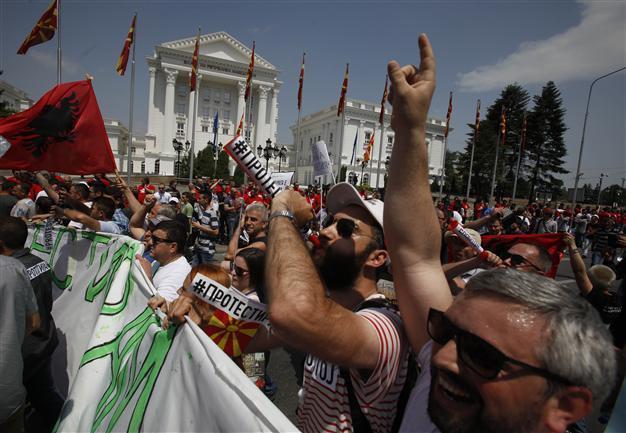Over 20,000 call for Macedonian government to step down
SKOPJE - Agence France-Presse

People carrying banners, national flags and flags of the ethnic communities protest in front of the Government building in Skopje, Macedonia, on Sunday, May 17, 2015. AP Photo
More than 20,000 people rallied in Macedonia's capital on Sunday to demand the resignation of Prime Minister Nikola Gruevski's government which is grappling with a deep political crisis and an outbreak of violence.Waving Macedonian, but also Albanian flags, opposition protesters chanted "Victory! Victory!" at the demonstration in Skopje, the culmination of months of wrangling between Gruevski and his centre-left opponents that has already sparked clashes.
Macedonia's problems deepened last weekend when 18 people were killed in a shootout in the northern town of Kumanovo between police and ethnic Albanian rebels.
The main opposition leader, Zoran Zaev, has vowed that May 17 protest will be peaceful, although the police brought in large supplies of anti-riot gear.
On a warm day, volunteers left bottles of water in front of the government building, in expectation of a long day.
Zaev said protesters would remain in front of the government building until Gruevski -- who has been in power for nine years -- and his cabinet stands down.
"The protest will continue. Some 4,600 activists, mostly young people, have said 'we'll stay regardless of whether you will or not'," he told the NOVA online television channel.
At the protest, Aleksandar Krstevski, a 33-year-old psychologist from Kumanovo, told AFP: "We will stay as long as it takes, until the final victory, until the prime minister's resignation."
Carrying a placard with the inscription "Goodbye Nikola", 29-year old Jelena said "there is a need to finish with this government."
The unrest last weekend was the worst in the former Yugoslav republic since its 2001 conflict between the government and ethnic Albanian rebels.
Eight police officers were among the 18 dead.
Thirty alleged gunmen, including 18 ethnic Albanians from neighbouring Kosovo, have been charged with terror offences following the shootout.
But the opposition and analysts have suggested the timing of the violence was suspicious, given the huge pressure on Gruevski's government.
Zaev's opposition Social Democratic Union of Macedonia (SDSM) is calling for the government to resign, accusing the ruling party of wiretapping 20,000 people, including politicians, journalists and religious leaders.
Zaev has released snippets of the alleged recordings that appear to show widespread government corruption, a murder cover-up and other wrongdoings.
His party has also boycotted parliament since an election in April last year, in which it claims Gruevski's VMRO-DPMNE party committed fraud.
"The time has come to show that we no longer want to live in a state led by Gruevski," the SDSM said in a statement.
Gruevski has remained defiant, insisting in an interview May 16 that he would not resign.
His government denies making the phone recordings released by Zaev, but not that the voices are authentic, although it says some are heavily edited or taken out of context.
The government in turn accuses Zaev and his followers of spying and of seeking to destabilise the country. It is due to hold a rival street protest on May 18.
Gruevski, Zaev and ethnic Albanian party leaders held talks this week to resolve the crisis, which could further hamper Macedonia's stalled bid for EU and NATO membership.
All sides pledged to condemn violence and support democratic values, but there was little sign of a serious resolution.
Two ministers and the intelligence chief resigned on Tuesday, after being accused of involvement in the wire-tapping scandal.
But Muamer Pajaziti, a Macedonian professor on European integration at Pristina University, said the resignations were only "a survival manoeuvre" by an increasingly unpopular government.
"The opposition and the public will not accept it as a solution. There is a critical mass for change led by the opposition. Slowly, on a larger scale, there are preparations for a broad anti-government coalition," Pajaziti told AFP.
Ethnic Albanians make up about one quarter of Macedonia's 2.1 million population.
Macedonia obtained EU candidate status in 2005, but is yet to begin accession talks.
















